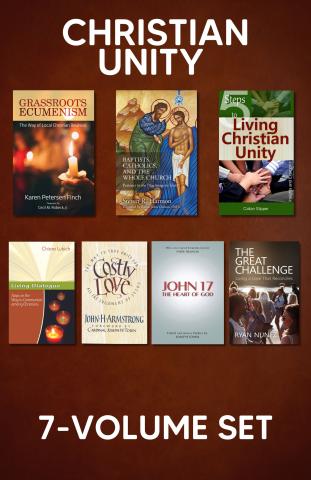
Grassroots Ecumenism

About the book
The quest for Christian unity has traditionally been initiated at the international level between official leaders of Christian denominations, with the effects of their dialogue expected to trickle down to local Christian communities. In Grassroots Ecumenism,
Karen Petersen Finch upends this process, proposing an approach to Christian unity that begins in your neighborhood. She draws directly from her experience equipping everyday Christians to know their own Christian tradition more thoroughly and to engage thoughtfully with separated Christians down the street and around the corner.
Endorsements
Karen Petersen Finch makes a compelling case that laypeople can serve the cause of Christian unity in their local settings as skilled theologians. She shares her personal experience in providing the necessary training, including a candid account of real obstacles that she faced along the way in equipping lay people to be “stewards of doctrine.” This is a wise, theologically solid—and wonderfully readable—book.
The rewards of ecumenical dialogue come alive in Dr. Karen Petersen Finch’s very engaging book. Through her poignant stories of real encounters and outlines of practical skills that can facilitate breakthroughs, this book will inspire readers toward engaging in ecumenical dialogue. She shows the importance of open, honest, and sympathetic acknowledgement of difference. But she also shows that most effective dialogues are surrounded by processes of self- and mutual education, and she provides rich theological and historical background that people can draw upon for deepening dialogue. While the book focuses upon dialogue between Reformed and Catholic traditions, she provides a model of how dialogue across many other kinds of differences can proceed fruitfully.
Karen Petersen Finch is at once a Presbyterian minister and an ecumenical theologian. In this book she tells the fascinating story of a joint Catholic-Protestant Vacation Bible School which spawned a lively experiment in Christian unity with implications far beyond its local origin. Practical, charitable, serious but not stuffy, here is a gift to the Lord’s people everywhere.
Ecumenism is sometimes seen as the preserve either of professional theologians and church leaders, or of local churches finding occasions to work and pray together. Karen Petersen Finch shows in this inspiring and informed book that in fact grassroots discussion of doctrinal issues by ordinary folk in churches is not only possible but essential for real ecumenism and effective mission. The book presents a model of “dialoging back” which has potential not just ecumenically but for all those learning to listen and walk together within a particular church, such as current Catholic explorations of synodality. Grassroots Ecumenism is original, practical, and underpinned by deep scholarship. It deserves to be widely read and practiced.
Karen Petersen Finch is a committed ecumenical theologian who is not given to hand wringing over lost momentum in global and national ecumenical institutions. Instead, she turns our attention to congregations, presenting a wise, practical vision and guide to local, grass roots ecumenical engagement. What makes Grassroots Ecumenism compelling are the many ways Karen Petersen Finch weaves together theological depth, process wisdom, practical advice, and honesty about both possibilities and pitfalls. Undergirding all of this is the conviction that ecumenism is a cord of three strands—personal relationships, practical structures, and theological dialogue. Too often, especially in local settings, interchurch efforts rely on a weak cord with only two strands—relationships and structures. Grassroots Ecumenism shows us how serious theological conversation can be the heart and soul of genuine Christian engagement in a world of divided churches.











